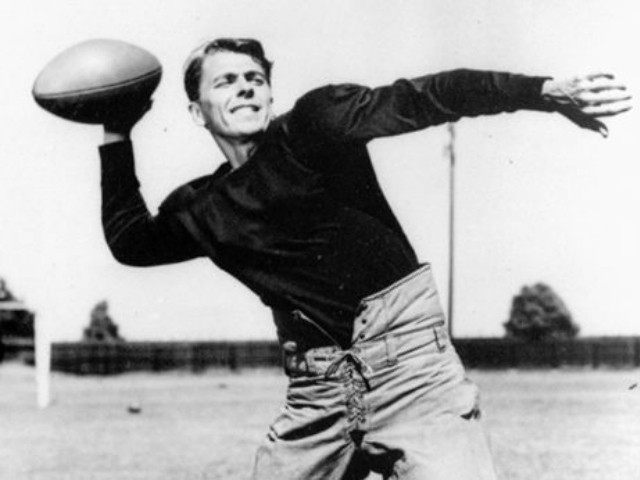Horse racing may be the sport of kings. Presidents prefer football.
“Of all the games I personally like foot ball the best,” Theodore Roosevelt wrote pigskin pioneer Walter Camp in 1895, “and I would rather see my boys play it than see them play any other.”
He watched his namesake compete in high school and then in his freshman year at Harvard. “I hereby grant you unconditional permission to play on the third Eleven,” the president wrote his son Ted following a collar-bone break. “Now do not break your neck unless you esteem it really necessary. About arms and legs I am less particular, although on the whole I prefer that even they should be kept reasonably whole.”
Roosevelt, whose son subsequently busted up his nose and ankle in the freshman Harvard-Yale game in 1905, worked with Yale’s coach, his old friend Walter Camp, to save the sport from a looming extinction that same season. The Rough Rider held a summit on the rough game at the White House. He used his office to ensure rules reform on a national level and to prevent his powerful alma mater from ditching the game. Rather than stand behind the Bully Pulpit, Roosevelt instead spoke softly and carried a big stick in his machinations to stave off the sport’s abolitionists.
So many of his successors shared TR’s affinity for football. Democrat and Republican presidents have disagreed on war, legislation, and much else. They agree on football.
Before Dwight Eisenhower devised how to beat Nazis on the beach, he dreamed of beating Navy on the gridiron. As Lars Anderson writes of the West Point cadet in Carlisle v. Army, “Football was the number one priority in his life.” The future general effectively ended his career by seeking to end the career of perhaps the greatest player who ever laced up cleats. In foolishly taking on Jim Thorpe, the undersized linebacker injured his knee and forever sidelined any hopes of continuing to compete.
John Kennedy didn’t score a touchdown in the Harvard-Yale game as his younger brother Ted did—let alone make the Crimson’s varsity squad. But he may have been the most famous evangelist of touch football in history.
Ronald Reagan played at Eureka College, called University of Iowa games for WHO in Des Moines, and famously portrayed George Gipp in Knute Rockne, All American, giving moviegoers an idealized version of Notre Dame’s player and coach—and the 40th president one of his most memorable lines.
The game even shaped presidents who never played it. Sour-grapes cops at Princeton arrested Yale cheerleader George W. Bush for tearing down the goalpost in 1967. Herbert Hoover, as manager of the Stanford football team, oversaw the enormous haul of $30,000 from the inaugural installment of the Big Game. He hired two carriages and six Stanford football players to successfully transport the silver dollars.
One of the Oval Office’s more forgettable occupants surely enjoyed the most memorable football career among the presidents. The University of Michigan won two national championships with Gerald Ford playing center and linebacker in the days of single-platoon football. In Ford’s days in Congress, a joking Lyndon Johnson famously accused him of playing too much football without a helmet.
Woodrow Wilson, who helped coach teams at Wesleyan and Princeton, repeatedly worked to stave off football abolitionists during his time in academia. “I believe it develops more moral qualities than any other game of athletics,” the 28th president maintained in a campus debate entitled, “Ought the Game of Football to Be Encouraged?” in which he took the pro side. “Ordinary athletics produce valuable qualities—precision, decision, presence of mind and endurance. No man can be a successful athlete without these four qualities. This game produces two other qualities not common to all athletics, that of co-operation, or action with others, and self-subordination. These are things to be encouraged, and they unquestionably come from the game of football.”
Why has football commanded the attention of so many commanders in chief?
“If ever a sport offered inducements to the man of executive ability, to the man who can plan, foresee, and manage,” Roosevelt’s friend Walter Camp informed, “it is certainly the modern American football.” The game employs strategy, relies on leadership, instills discipline, mimics war, and, as Woodrow Wilson held, compels cooperation and forces the individual to put the team first. One could see how leaders of men of various political stripes might find part or all of that appealing.
Or, perhaps, long before they donned suits and delivered soporifics disguised as speeches, they just really, really liked to muddy up their clothes, accelerate their heartbeat, and crash into other boys at full speed.
Daniel J. Flynn, the author of The War on Football: Saving America’s Game, edits Breitbart Sports.

COMMENTS
Please let us know if you're having issues with commenting.